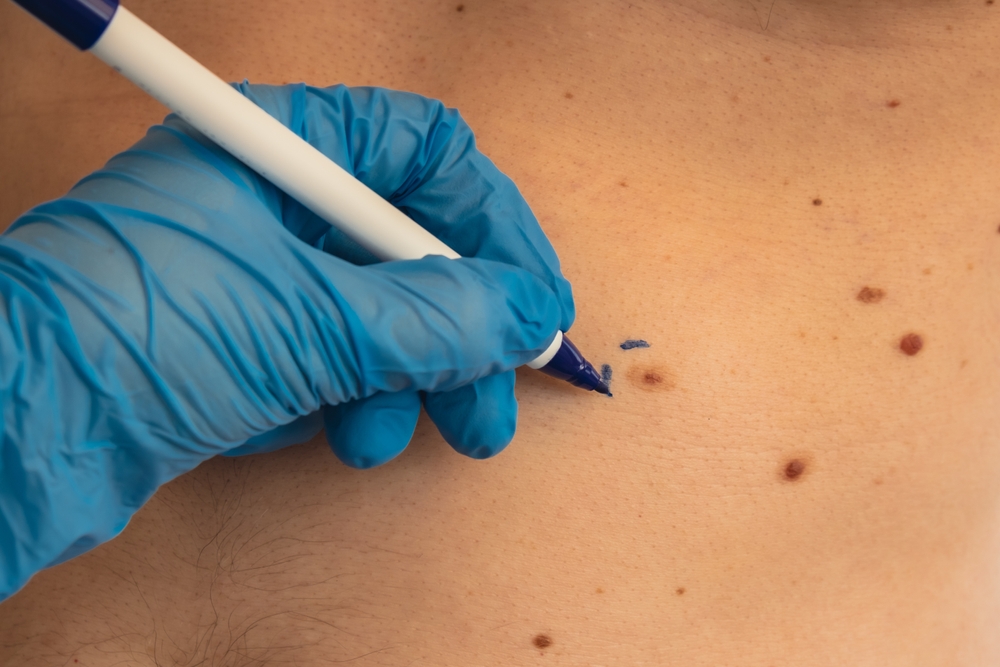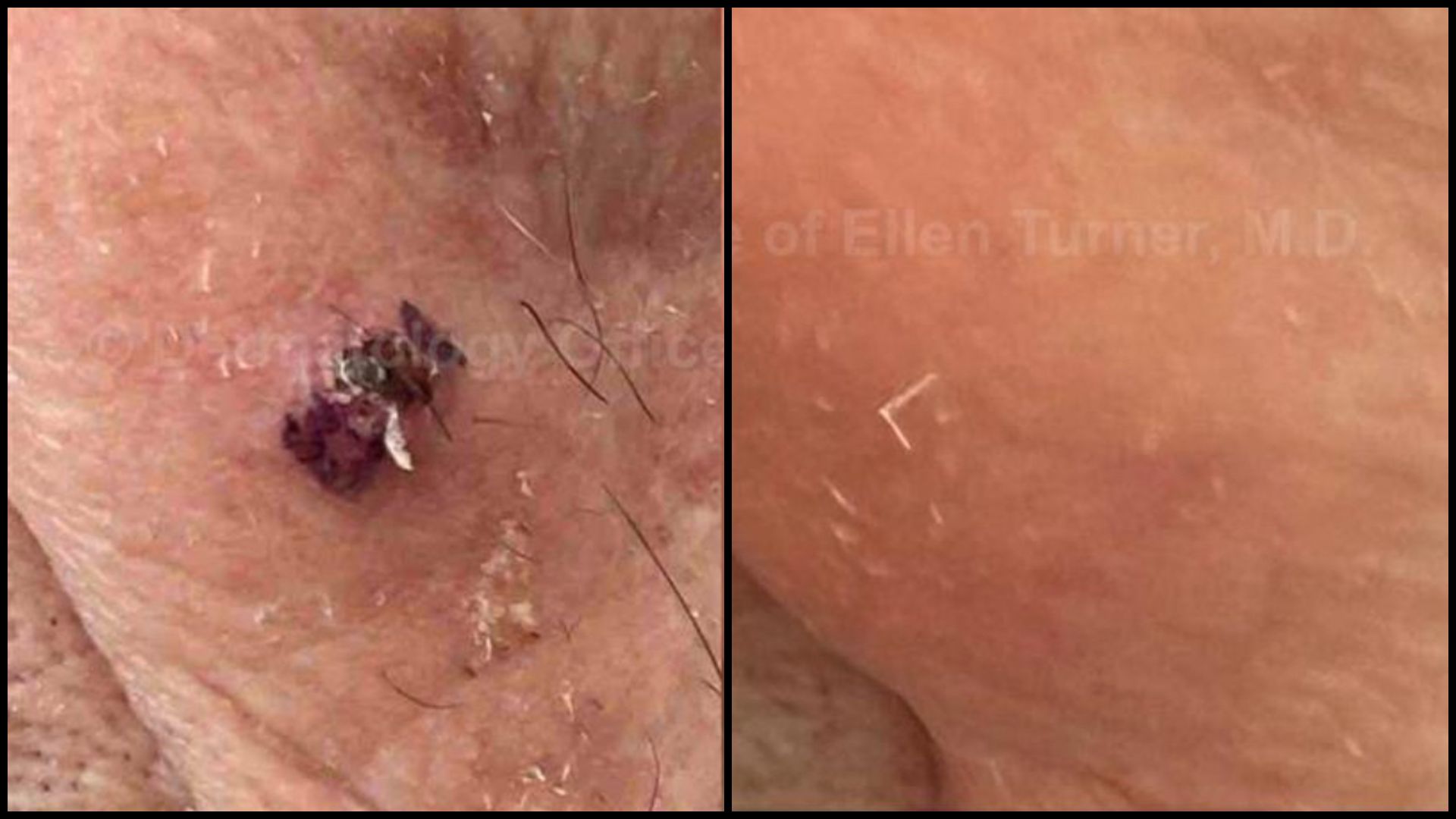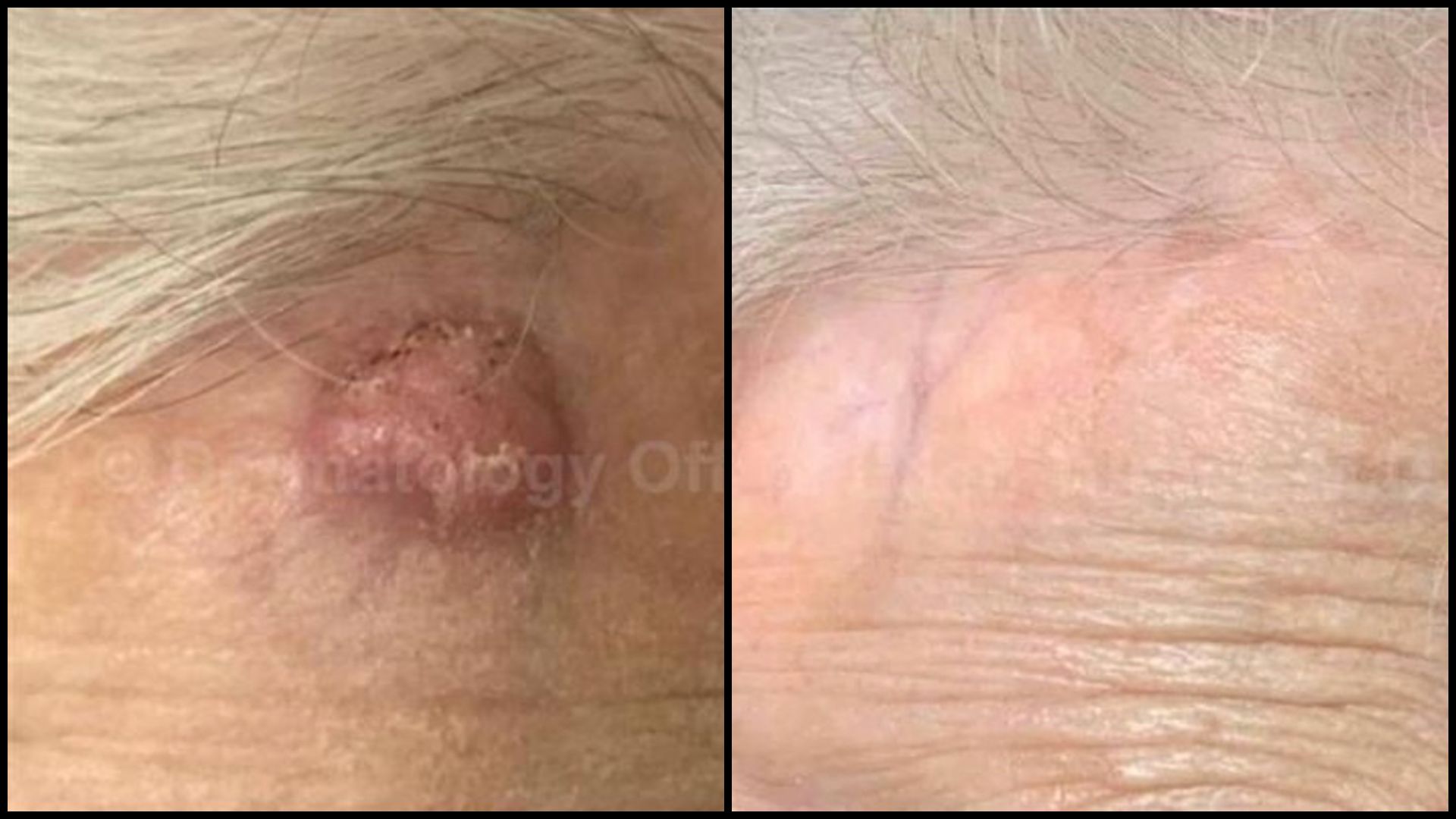Medical Dermatology
Squamous Cell Carcinoma
- Home
- Medical Dermatology
- Skin Cancer
- Squamous Cell Carcinoma
Effective Treatments in the Dallas Area for a Common Form of Skin Cancer That Causes Rough, Scaly Lesions

Squamous cell carcinoma is the second most common type of skin cancer, often appearing as bumps, marks, or lesions on the skin. Raised growths may develop and may not go away on their own. If this is the case for you, Dr. Ellen Turner can successfully treat your biopsy-proven squamous cell carcinoma at her Dallas or Irving offices. Treatment options include Superficial Radiation Therapy (SRT)—a highly effective, non-surgical approach—as well as Mohs surgery or surgical excision. The right strategy will depend on your unique needs and diagnosis.
Medical Dermatology
Contact us for more advice on diagnosis and treatment of squamous cell carcinoma in the Dallas area at the Dermatology Office of Dr. Ellen Turner. Call us at (214) 945-8436 or submit a contact form to request a consultation.
What Is Squamous Cell Carcinoma?
Simply put, skin cancer is an uncontrollable, abnormal growth of cells in the outer layer of skin, and it usually develops on areas that are frequently exposed to the sun. Unrepaired DNA damage caused by ultraviolet radiation triggers mutations, typically in the epidermis or top layer of skin—though it can affect the middle layer as well. There are three types of cells in this layer: squamous cells, basal cells, and melanocytes. Squamous cells are thin, flat cells, while basal cells are deeper round cells, and melanocytes are melanin-producing cells found in the lower area of the epidermis.
Squamous cell carcinoma develops in the flat cells that are close to the surface of the skin.
Along with basal cell carcinoma and melanoma, squamous cell carcinoma is one of the three major types of skin cancer. Squamous cell carcinoma is a non-melanoma type of skin cancer that occurs from an aberrant growth of keratinocytes, a type of skin cell that originates squamous cells. It is the second most common type of skin cancer, and it usually develops in sun-exposed skin, resulting in part from intense ultraviolet radiation and an accumulation of exposure to the sun over months to years.
What Are the Risk Factors for Squamous Cell Carcinoma?
Who is most likely to get squamous cell carcinoma? What is the primary risk factor for squamous cell carcinoma? There are certain variables that can make you more likely to develop this cancer. Although squamous cell carcinoma can affect anyone, some of the biggest risk factors are having long term sun exposure; sun damage to your skin at a young age; a pale or fair complexion; blue, green, or grey eyes; red or blond hair; being age 65 or older; having a weak immune system, a history of sunburns, pre-cancerous spots on the skin, or skin cancer; exposure to radiation; having Bowen’s disease, HIV, or AIDS; and exposure to chemicals such as arsenic. Men are about twice as likely to get squamous cell carcinoma.
What Are the Signs and Symptoms of Squamous Cell Carcinoma?

Before and After Superficial Radiation. Results may vary
What are the first signs of squamous cell carcinoma? What does squamous cell carcinoma start off looking like? What color is squamous cell carcinoma? If you have been noticing changes to the appearance of your skin, these are some of the things you might be wondering about. Squamous cell carcinoma of the skin is typically either a pinkish, reddish, or brown patch with overlying scaling. This skin cancer can manifest as a bump or larger plaque. Sometimes these abnormal cells may bleed and have a resulting crusted appearance. These lesions can grow very slowly, but there are some variants of squamous cell carcinoma that can grow quite rapidly. These are termed keratoacanthoma, and they typically appear more crateriform (meaning crater-like) in appearance on the edges with a thick, heaped up, central crust. Most commonly, squamous cell carcinoma, or SCC, prefers to stay on the surface of the skin, but lesions can run down hair follicles and spread more deeply into nerves in the surrounding area.
Can Squamous Cell Carcinoma Spread?
The next question patients will usually have is “How serious is squamous cell carcinoma?” or “Can you live with squamous cell carcinoma?” Squamous cell carcinoma typically grows slowly over time, but as with the more aggressive types of SCC that spread into the follicle areas or the nerves, these can potentially become dangerous—especially if left untreated. If a patient has a new lesion, growing lesion, or changes in the appearance of a lesion, they should seek out the evaluation and advice of a dermatologist such as Dr. Ellen Turner right away. Squamous cell carcinoma, when caught early, can be easily treated. When treated early, the best outcomes can occur, and can allow for a normal life span and good quality of life.
Medical Dermatology
Would you like to learn more about prevention, diagnosis, and treatment for squamous cell carcinoma in the Dallas area from the Dermatology Office of Dr. Ellen Turner? Call us at (214) 945-8436 or submit a contact form to request a consultation.
How Is Squamous Cell Carcinoma Diagnosed?
Dr. Turner will start by asking you about your medical history, including your history of severe sunburns or indoor tanning, discuss any discomfort or other symptoms of your condition, talk to you about when you first started to see the skin lesion, give you a physical exam to check the size, color, and other characteristics of the spot, and check for other spots on your body. Dr. Turner will remove a sample of the lesion to test it if it looks questionable.
To diagnose squamous cell carcinoma, Dr. Turner will work with members of her trained staff to perform a biopsy, which involves anesthetizing the area to be sampled and surgically removing some of the skin cells in question. A certified dermatopathologist, who is specially trained to identify skin conditions, will examine the sample in a pathology lab, seeking to identify malignant cells and, if present, determine how far they extend into the skin. Superficial squamous cell carcinoma is limited to the uppermost layers, while the nodular form affects all of the skin’s layers in the sample. Equipped with this knowledge, Dr. Ellen Turner will recommend the best treatment possible.
How Is Squamous Cell Carcinoma Treated?
Patients diagnosed with squamous cell carcinoma have multiple treatment options, and Dr. Ellen Turner works closely with each patient to select the most effective and appropriate approach for their specific situation. In recent years, Superficial Radiation Therapy (SRT) has become the preferred treatment for many cases of non-melanoma skin cancer, including squamous cell carcinoma, because it is completely non-invasive, painless, and leaves no lasting scar. This therapy delivers a carefully measured dose of radiation directly to the cancerous cells with precision, including a small margin of surrounding tissue, to ensure clearance while protecting healthy skin. With cure rates of 97–99%, SRT is considered just as effective as Mohs surgery but without the

Before and After Superficial Radiation. Results may vary
risks of surgery, downtime, or cosmetic concerns, which makes it an excellent choice for areas where preserving appearance and function are critical, such as the nose, ears, eyelids, and even the lower legs. Dr. Turner has partnered with a board-certified radiation oncologist to provide her patients with the highest standard of care, and she has found that many patients in the Dallas/Fort Worth area prefer SRT because it combines outstanding results with comfort and convenience. While traditional surgical excision is still used in some cases and can be performed in-office with local anesthesia, it always leaves a scar and requires wound care for several months as the area heals. For very superficial cancers, topical therapies such as 5-fluorouracil cream may be prescribed, which work by triggering a reaction on the skin’s surface to destroy abnormal cells, though this treatment can cause redness, crusting, and swelling during the healing process. In select cases where surgery is chosen in sensitive locations, Mohs surgery may still be performed by a specialist, but this method is increasingly considered less favorable because it is invasive, time-consuming, and typically results in scarring, making it less appealing compared to modern, non-invasive therapies such as superficial radiation. Regardless of the treatment path chosen, Dr. Turner emphasizes the importance of long-term follow-up, recommending full-body skin exams at least twice a year, since patients who have experienced one skin cancer are at higher risk for developing additional lesions in the future, and early detection provides the best outcomes.
Beyond Squamous Cell Carcinoma: Which Other Conditions Can Be Treated?
Aside from squamous cell carcinoma, the Dermatology Office of Dr. Ellen Turner offers treatments for many other types of conditions or disorders that affect the skin, including other forms of skin cancer such as basal cell carcinoma (BCC), melanoma, and pre-cancerous lesions like actinic keratosis. Dr. Turner treats patients with common conditions such as acne, eczema or atopic dermatitis, psoriasis, and rosacea.

